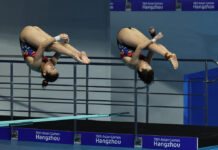
KUALA LUMPUR — The World Junior Championships mixed team event (Suhandinata Cup) begins today in Nanchang, China, and has already drawn mixed reactions from former players due to the new relay scoring format.
According to the Badminton World Federation (BWF), the team relay scoring system offers greater opportunities for emerging badminton nations to challenge the traditional powerhouses.
Since its inception in 1990, the Suhandinata Cup has only been won by four countries – China, Korea, Malaysia, and Indonesia.
The new 10-match, 11-point format — a race to 110 points — was first tested at the 2018 Youth Olympics in Buenos Aires, Argentina. However, at that time, each team was represented by players from different National Olympic Committees (NOCs).
Kwan Yoke Meng, the former junior head coach at the Akademi Badminton Malaysia (ABM), believes the new scoring format is more exciting and competitive.
“Personally, I think it’s exciting because the matches won’t be so one-sided. I mean, if your team is strong, your team is strong. But at least now, other teams have a better chance of turning the tie around,” Yoke Meng told Scoop when contacted.
Yoke Meng, who is in the process of setting up his own junior academy, also joked about how the new format might benefit the Malaysian juniors.

“We Malaysians are usually good in the first game, but run out of steam in the second and third. This new format could suit us,” he quipped.
However, former England international turned BWF pundit Ben Beckman is less convinced by the new format.
“My initial thoughts are that it seems unnecessary and a little gimmicky. I don’t quite understand the need for it, if I’m honest,” said Ben in an Instagram post.
“I know they tried it at the 2018 Youth Olympics, but I didn’t watch that, so I can’t comment. But even if I had, I’d probably still feel the same,” he added.
In fairness, Beckman told Scoop he would want to see it firsthand before making further comments.
“That minimum of five points doesn’t make sense either. Why are we gifting points that aren’t earned? Imagine a team winning because of one or two strong players, and they only got close due to unearned points. That, for me, is dangerous and doesn’t feel right at all.
“I’m very sceptical, but maybe I need to see it firsthand before making a final judgement.”

Former men’s singles world champion (2010), Chen Jin, who is now a junior coach, was part of a three-day training camp for players from developing countries.
Chen Jin told BWF he was excited by the possibilities the new scoring format would present.
“It’s new to me as well. You never know what will happen… perhaps this gives weaker teams a chance to do well against stronger teams,” Chen said.
A total of 39 countries have been divided into eight groups for the preliminary round, with only the group winners advancing to the quarter-finals.
Malaysia are in Group C, alongside Mongolia, Estonia, Norway, and the Netherlands.
Malaysia, who won bronze at the previous edition in Spokane, United States, face Mongolia at 9am today, followed by Norway at 3pm. — September 30, 2024



